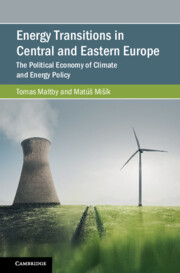Book contents
- Energy Transitions in Central and Eastern Europe
- Cambridge Studies on Environment, Energy and Natural Resources Governance
- Energy Transitions in Central and Eastern Europe
- Copyright page
- Dedication
- Contents
- Figures
- Tables
- Preface
- Acknowledgements
- Abbreviations
- Introduction
- 1 The Development of Energy and Climate Policy in the EU and CEE
- 2 A Conceptual Framework for Understanding Energy Transitions
- 3 Energy Governance
- 4 The Effect of Foreign Policy on Climate and Energy Policy
- 5 State-Society Relations
- 6 The Influence of CEE Countries on EU Climate and Energy Policy
- 7 The Global Context
- 8 Conclusion
- Bibliography
- Index
4 - The Effect of Foreign Policy on Climate and Energy Policy
Published online by Cambridge University Press: 19 April 2024
- Energy Transitions in Central and Eastern Europe
- Cambridge Studies on Environment, Energy and Natural Resources Governance
- Energy Transitions in Central and Eastern Europe
- Copyright page
- Dedication
- Contents
- Figures
- Tables
- Preface
- Acknowledgements
- Abbreviations
- Introduction
- 1 The Development of Energy and Climate Policy in the EU and CEE
- 2 A Conceptual Framework for Understanding Energy Transitions
- 3 Energy Governance
- 4 The Effect of Foreign Policy on Climate and Energy Policy
- 5 State-Society Relations
- 6 The Influence of CEE Countries on EU Climate and Energy Policy
- 7 The Global Context
- 8 Conclusion
- Bibliography
- Index
Summary
Energy supply security has been a crucial energy policy issue for CEE countries at least since the natural gas supply disruptions of 2006 and 2009. This book argues that energy security plays a generally more important role within the CEE region than issues related to climate change. However, this chapter evaluates the interplay between ideas, institutions and the material nature of energy systems in the development of energy policy. In doing so it also highlights the social construction of energy security, demonstrating that energy security is not self-evident or correlated within the CEE region with dependency on energy imports from Russia. Individual CEE countries perceive energy supplies as a security issue to a different extent, identifying the source and extent of insecurity or risk differently, and supporting different policy responses as a result. While some countries, for example, Hungary or Bulgaria, have tended to perceive Russian energy as a means to guarantee energy security, others – most notably, Lithuania and Poland – consider energy security to be one of their main policy issues and imports of Russian energy as one of the main threats to this.
Keywords
- Type
- Chapter
- Information
- Energy Transitions in Central and Eastern EuropeThe Political Economy of Climate and Energy Policy, pp. 65 - 102Publisher: Cambridge University PressPrint publication year: 2024



